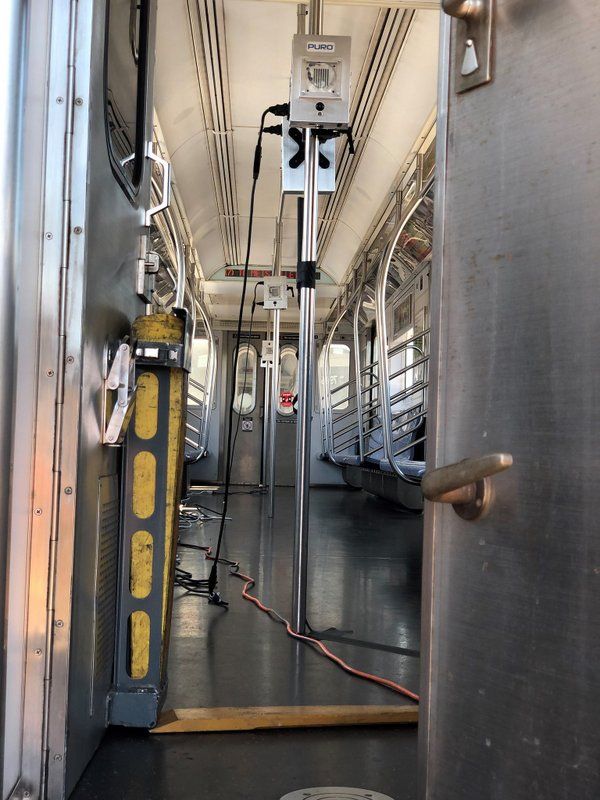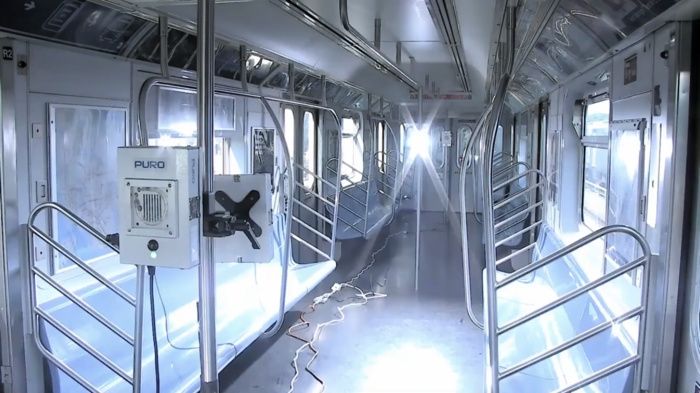

In mid May, the MTA began a pilot to use ultraviolet disinfecting technology to eradicate COVID-19 on New York City subways, the first of its kind on mass transit globally. Deemed a success, this past Friday, the MTA expanded the UV program at the MTA’s maintenance shops at Corona, Coney Island, Jamaica, and Pelham, and will clean more than 6,500 train cars in the MTA’s fleet using full spectrum Ultraviolet (including germicidal UV-C, UV-B and anti-bacterial UV-A).
 Courtesy of Metropolitan Transit Authority of the State of New York
Courtesy of Metropolitan Transit Authority of the State of New York
Ultraviolet light is proven to be an effective technology for eliminating viruses, and has been previously used to combat the SARS virus. To help prove that the technique would be successful in eliminating COVID-19, the MTA requested the help of Dr. David Brenner, Director of the Center for Radiological Research at Columbia University. Working under proper biosafety guidelines, Dr. Brenner has been testing the efficiency of miniaturized UV lamps to kill COVID-19. Last month, he reported the first-ever demonstrated test of ultraviolet light that efficiently killed the virus on a New York City subway car.

Courtesy of Metropolitan Transit Authority of the State of New York
The pilot used about 150 dual-headed mobile devices from Denver-based company PURO Lighting to “test and evaluate the efficiency and cost-effectiveness of UVC technology in a number of settings,” said the MTA in March. Now, with the success of the first pilot, the program will expand to clean full train sets. Senior Vice President for Subways at New York City Transit, Sally Librera said, “We continue to move full speed ahead with our efforts to explore any and every idea that might help keep our system safe during these challenging times. Ultraviolet technology is one of many outside-the-box ideas we’re pursuing to disinfect the system. I look forward to continuing to expand this pilot and learning more about how ultraviolet technology can best help us moving forward.”
This pilot is one of many steps the MTA has taken in its disinfecting effort to keep employees and customers safe. Back in March, the MTA announced its updated sanitation strategies, to clean frequently used surfaces across all its services, including the subway, bus, Access-A-Ride, Long Island Railroad and Metro North. The effort continued on May 6, when the MTA started its historic closing of subway system from 1 a.m. to 5 a.m. to allow for train cars and stations to be disinfected every 24 hours
The MTA also launched an industry-leading “Temperature Brigade” on March 24, taking employee temperatures at work locations, implementing rear-door boarding on buses and eliminating cash transactions at stations and on commuter rails to prevent person-to-person contact to ensure the safety of operating employees. The agency has also distributed 3 million masks, 5.4 million pairs of gloves, 3.1 million sanitizing wipes, 36,000 gallons of hand sanitizer, 125,000 hand sanitizer bottles, and 8,000 face shields to its heroic frontline workers. Most recently, the MTA released hundreds of thousands of adorable animal footprint decals to remind passengers to social distance on train platforms and in stations.
The ultraviolet pilot is a innovative, bold step in the efforts by the MTA to fight COVID-19. As the city begins to re-open, people who have not taken the subway since March have returned. Untapped New York’s subway tour guide Christa Avampato, who took her first ride on Monday says that the subways are “so clean I can see my reflection in the surfaces. And that famous subway smell? Gone.”
Next, check out the Top 20 Secrets of the NYC Subway.

